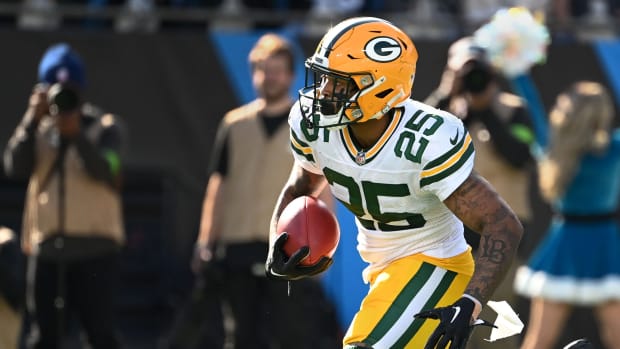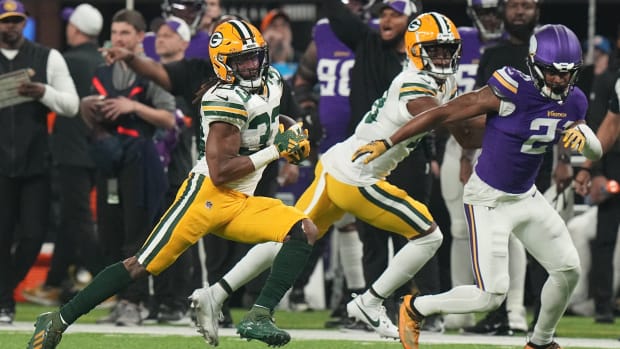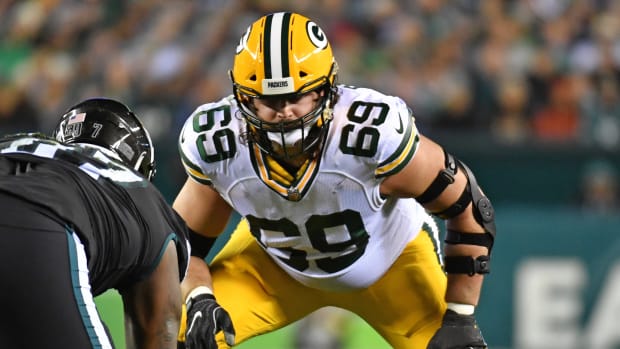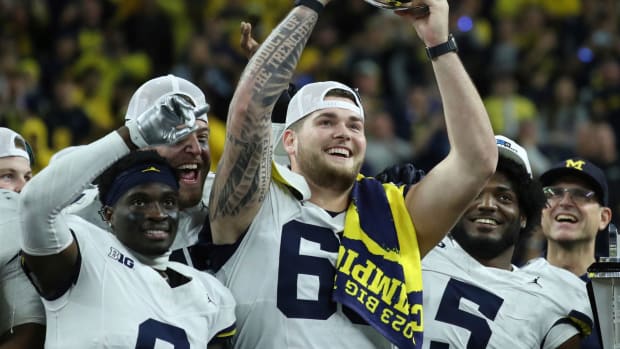Multitasking Samuel Carries 49ers Into Showdown vs. Packers
GREEN BAY, Wis. – The most explosive running back in this year’s NFL playoffs will be on the field on Saturday night when the Green Bay Packers host the San Francisco 49ers.
No, it’s not Green Bay’s Aaron Jones. Not AJ Dillon, either. And it’s not San Francisco’s lead back, Elijah Mitchell.
Rather, it’s 49ers receiver Deebo Samuel. Of the 49 players with at least 60 carries beginning with Game 9, Samuel ranks third with a 6.59-yard average. Even while merely moonlighting in the backfield, Samuel ranked 22nd in the NFL with 415 rushing yards – 79 yards more than Jones, by the way – and was third with eight rushing touchdowns.
“He’s dynamic, man,” said Packers star Davante Adams, an All-Pro receiver alongside the Rams’ Cooper Kupp and Samuel. “He’s a hell of a wideout. He’s basically a punt returner as soon as he gets the ball in his hands. It’s special to watch because you don’t really see guys be able to maximize their YAC the way that he does.
“It’s something that I told y’all early in the season, I was watching some Lamar Jackson highlights just to really just see if I can see in slow-mo what he’s seeing in fast-motion. That’s kind of the same thing as what Deebo does. He gets the ball and he gets right upfield. They put him in some great positions to make plays. He’s a dynamic player. He’s fun to watch.”
Giving Samuel frequent reps at running back has changed the 49ers’ season. In the first eight games of the season, the 49ers were 3-5 and averaging 23.0 points per game. Samuel was dominant as a receiver with four 100-yard games during that span, but that production didn’t translate to enough points or wins.
Starting with a Week 10 (Game 9) showdown against the Rams, the 49ers began to dabble more with Samuel in the backfield. After getting six carries in the first eight games, Samuel carried five times for 36 yards and one touchdown and caught five passes for 97 yards and another touchdown as the 49ers earned a season-turning 31-10 win.
Starting with that game and including Sunday’s playoff upset of Dallas, the 49ers went 8-1 and averaged 26.9 points with Samuel in the lineup. While he had only one 100-yard receiving game during that span, he averaged 7.0 carries for 46.1 yards and 0.9 touchdowns. The 49ers won all seven games in which he had at least one rushing touchdown. Against the Cowboys, Samuel was practically a nonfactor in the passing game with three receptions but he was the game’s best player with 10 carries for 72 yards and an impressive cut-back touchdown.
The element of the unknown – will he line up at receiver or running back on any particular play? – only adds to the challenge for the defense.
“It definitely adds another layer to their complex offense,” Packers coach Matt LaFleur said. “They do such a great job of formationing, motioning, giving very complementary plays. You’ve got to be very disciplined with your eyes and your rules and responsibilities. But Deebo, he is a dynamic player. He’s one of the more elite players in this league, and they find different ways to get him the ball, whether it’s handing it off, whether it’s reverses, in the passing game. He’s a physical guy. And I think it does present some problems when you just aren’t quite sure where he’s going to line up. Is he going to be in the halfback position and the halfbacks going to be out wide, or vice versa? He’s a guy we have to account for on every play.”
With eyes on Samuel, who ranked No. 1 among receivers in yards after the catch and almost broke more tackles on 77 catches than every Packers receiver combined on 238, it’s created more opportunities for star tight end George Kittle and up-and-coming receiver Brandon Aiyuk to catch passes from Jimmy Garoppolo.
“The defenses don't know the play that's coming,” offensive coordinator Mike McDaniel said last month. “So, in general, they have to play percentages. When you broaden the percentages of where you throw, it creates more space. They want to constrict everything and be able to defend stuff in tight quarters. In general, defenses, it stresses them out when you use more of the field. We try to do it in the run and pass game.”




